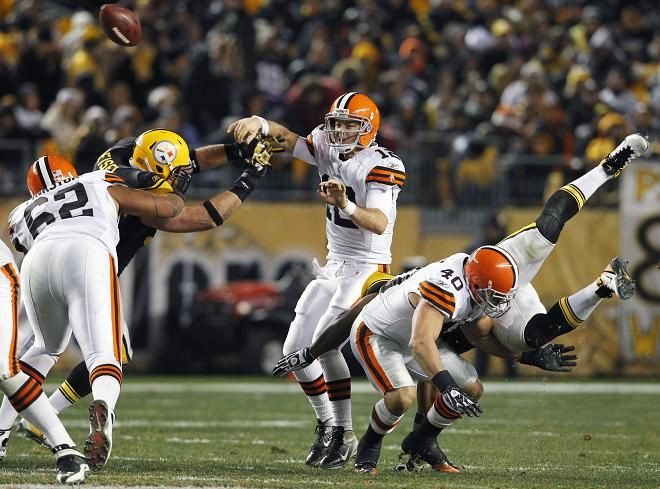NFL Probes Sideline Procedures After McCoy Helmet-to-Helmet Hit

When James Harrison hit Cleveland Browns quarterback Colt McCoy in a helmet-to-helmet collision during last week’s Thursday night game, the linebacker set off a chain of events that highlights the procedural problems facing the NFL when players suffer blows to the head.
On December 5, twelve former players filed a lawsuit in New Jersey federal court, alleging the NFL failed to take necessary steps to protect players from long-term brain injuries in the face of overwhelming medical evidence that on-field concussions lead directly to such injuries.
Just three days later, McCoy was drilled in a collision with the Pittsburgh Steelers' Harrison and was helped off the field by trainers.
“Honestly, I don't remember being hit,” McCoy told the Elyria Chronicle-Telegram after the game.
McCoy sat out two plays, then threw an interception three plays after returning to the game.
“He never should've gone back in the game,” Colt’s father, Brad, a high school football coach, told a local paper last week. “He was basically out after the hit. You could tell by the ridigity of his body as he was laying there.”
Browns medical staff focused on McCoy’s left hand, fearing it had been broken on the play. Browns Coach Pat Shurmur claimed the quarterback did not begin showing concussion symptoms until after the game.
On Wednesday, Browns President Mike Holmgren told reporters at a press conference that trainers did not see the hit to McCoy and did not realize the impact because they were treating other injured players. Holmgren said the team's medical staff believed McCoy was "lucid and talking" when they treated him on the field, and trainer Joe Sheehan told Shurmur that McCoy "was good to go."
The NFL and the NFL Players Association's chief physicians -- Dr. Elliott Pellman and Dr. Thom Mayer -- have conducted an initial review of the hit and the medical staff’s procedures. A union source told ESPN’s Chris Mortensen the handling of McCoy is being labeled a "blatant system failure" because the team's medical staff did not conduct proper testing before sending him back into the game.
The Brown's public relations staff asked television cameras not to turn on their lights during a postgame interview with McCoy, suggesting an increased sensitivity to light commonly associated with concussions. However Colt was not administered the mandatory Sport Concussion Assessment Tool review, referred to as SCAT 2, until the morning after the game. Results were abnormal, and McCoy was sent home to rest.
NFLPA spokesman George Atallah said Monday, "We're going to continue to gather information about this incident. Until we have a full set of data, we will pursue this with full confidentiality."
Harrison was handed a one-game suspension for the hit.
The investigation may move forward a previous NFL proposal to require an independent neurologist to be on hand at each game.
Published by Medicaldaily.com



























